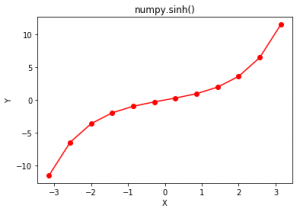📌 相关文章
- Python中的 numpy.sinh()
- C++ sinh()(1)
- C++ sinh()
- sinh(x) - Javascript (1)
- sinh(x) - Javascript 代码示例
- PHP | sinh( )函数
- PHP | sinh( )函数(1)
- Python| TensorFlow sinh() 方法
- Python| TensorFlow sinh() 方法(1)
- Python – math.sinh()函数
- Python – math.sinh()函数(1)
- Python| PyTorch sinh() 方法(1)
- Python| PyTorch sinh() 方法
- JavaScript数学sinh()
- JavaScript数学sinh()(1)
- C++ STL 中的 sinh()函数
- C++ STL 中的 sinh()函数(1)
- Java Math sinh()(1)
- Java Math sinh()
- C#| Math.Sinh()方法(1)
- C#| Math.Sinh()方法
- Python – tensorflow.math.sinh()(1)
- Python – tensorflow.math.sinh()
- \ sinh-Tex命令
- JavaScript Math sinh()方法(1)
- JavaScript Math sinh()方法
- JavaScript | Math.sinh()函数
- JavaScript | Math.sinh()函数(1)
- Python – cmath.sinh()函数(1)
📜 Python中的numpy.sinh
📅 最后修改于: 2020-06-18 06:10:41 🧑 作者: Mango
numpy.sinh(x[, out]) = ufunc ‘sin’) :
此数学函数可帮助用户计算所有x(作为数组元素)的双曲正弦值。
等效于1/2 *(np.exp(x)– np.exp(-x))或-1j * np.sin(1j * x)。
参数:
array:[array_like]元素的弧度。
2pi弧度= 36o度返回:
对于所有x即数组元素,其双曲正弦值为x的数组.
代码1:
# 解释sinh()函数的Python3程序
import numpy as np
import math
in_array = [0, math.pi / 2, np.pi / 3, np.pi]
print ("输入数组 : \n", in_array)
Sinh_Values = np.sinh(in_array)
print ("\n正弦双曲值 : \n", Sinh_Values) 输出:
输入数组 :
[0, 1.5707963267948966, 1.0471975511965976, 3.141592653589793]
正弦双曲值 :
[ 0. 2.3012989 1.24936705 11.54873936]
代码2:图形表示
# Python程序显示sinh()函数的图形表示
import numpy as np
import matplotlib.pyplot as plt
in_array = np.linspace(-np.pi, np.pi, 12)
out_array = np.sinh(in_array)
print("in_array : ", in_array)
print("\nout_array : ", out_array)
# 红色代表numpy.sinh()
plt.plot(in_array, out_array, color = 'red', marker = "o")
plt.title("numpy.sinh()")
plt.xlabel("X")
plt.ylabel("Y")
plt.show() 输出:
in_array:[-3.14159265 -2.57039399 -1.99919533 -1.42799666 -0.856798 -0.28559933
0.28559933 0.856798 1.42799666 1.99919533 2.57039399 3.14159265]
out_array:[-11.54873936 -6.49723393 -3.62383424 -1.9652737 -0.96554336
-0.28949778 0.28949778 0.96554336 1.9652737 3.62383424
6.49723393 11.54873936] 